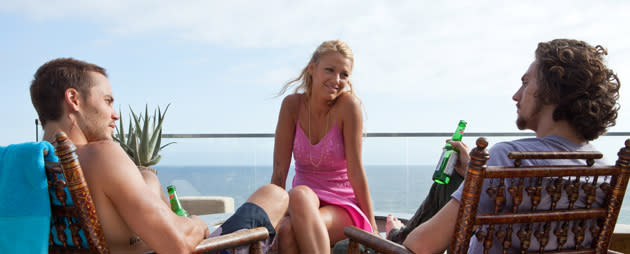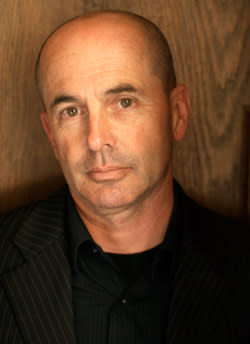 The Reel Breakdown
The Reel BreakdownA civilized discussion with Don Winslow, the author and co-screenwriter of ‘Savages’

In "Savages," pot entrepreneurs Ben (Aaron Johnson) and Chon (Taylor Kitsch) discover the organic nature of the drug industry: You can't grow or sell without being part of a larger endeavor that reaches back to the Mexican cartels. When the Orange County surfer dudes resist a hostile takeover, Mexican drug queenpin Elena (Salma Hayek) kidnaps their mutual love, O (Blake Lively). As anyone who appreciates crime stories knows, now it's personal. I checked in with shrewd "Savages" novelist and co-screenwriter Don Winslow in Manhattan as his book explodes onscreen Olive Stone-style and the prequel, "The Kings of Cool," hits bookshelves.
Thelma Adams: Two cabs just passed me on Sixth Avenue with "Savages July 6th" ads on their roofs. Have you ever experienced that kind of notice?
Don Winslow: Never! Last Friday, I was in Los Angeles, and it was the same thing: ads wrapped around buildings. It's surreal.
[Related: Adams on Reel Women: Women love Channing Tatum's male stripper with a heart of box office gold]
TA: I posted on Facebook that I had read "Savages" and what an adrenaline rush it was, and a writer friend commented, "I hope it's not another book where Mexicans are seen as savages." "No," I replied, "it refers to the fact that both sides see each other as savages." Don, you wrote that when middle- and upper-class Mexicans view Americans, they sometimes see us as savages. Why?
DW: There are various kinds of savagery: emotional, spiritual, economic, and cultural savagery. If I were Mexican, I'd look at the U.S. with incredible frustration. On the one hand, here is this giant to the north, their government is telling you, "Stop the drugs," and yet the population is spending billions and billions of dollars and saying, "Keep the drugs coming." Mexicans generally tend to look at our familial life as somewhat savage, too, in the way that we scatter over the four corners of the country, leave each other, don't really have as much of a sense of family as maybe we once had.
TA: And then there's physical savagery, like the seven dismembered bodies found in Sinaloa, Mexico, last month.
DW: It certainly does refer to the torture and murder in Mexico. But one point that I tried to make over and over again, whether it's directly in the book or in the media, is that the "Mexican drug problem" is a misnomer. It's the American drug problem. We're 5 percent of the world's population. We buy 25 percent of the world's illegal drugs. You can't point your finger at the producer country and say it's their fault.
TA: It's supply and demand.
DW: Buyer and seller.
[Related: Indie Roundup: 'Beasts of the Southern Wild' director Benh Zeitlin]
TA: When I attended Berkeley, there was recreational drug use and civilized pot dealers, but when one of those student dealers expanded in the market, he faced resistance from the professionals.
DW: You're describing exactly what happens with Ben and Chon in "Savages" and "The Kings of Cool." They enter this idealistically and a little naively. When they reach a certain level of success, that success threatens people, and the people that Ben and Chon confront are not going to push back with debate or argument or even just strict economic "Let's see whose product is better" competition. They're going to push back with violence.
TA: Deep within the cartels, there's Elena, the Mexican narcotraficante queen played by Salma Hayek. Elena says that she can't afford to be nice to these people. She has to show force. She has to deal with it decisively, because if she shows weakness, she falls prey to this game that has its own rules that Ben and Chon don't understand.
DW: It takes Ben and Chon a while to catch on to that. Elena is in a double and triple bind. As the head of a cartel, she can't afford to let herself be bested by these two guys. Also, as the female head of a cartel, she can't afford to look weak because the male members -- unfortunate phrasing -- of the cartel would be much more willing to take a shot at her.

TA:
Right now, news of the Mexican cartels is everywhere. Has the Baja cartel become the go-to villains like Russians in the Cold War?
DW: It reflects a reality. Pick up the papers. We always think of borders as something that separates two peoples but of course they unite them. It's something you have in common, literally. So, as you know, the cultures of San Diego and Tijuana have been closely aligned forever. A similar traffic comes north. Mexicans come up here to do shopping, to go to the doctors, to have their kids educated. Or, a lot of Mexican families of upper-middle to upper class come to the United States, have the kid born here, and then the child's a dual citizen.
TA: The book is full of telling details. Audiences familiar with "The Real Housewives of Orange County" will recognize the beach scene where your main characters dwell and deal.
DW: I was writing about a small niche in Orange County but one that exists, that you have seen to a certain extent on "The Housewives of OC," and by the way, I see those women at restaurants and on the beach, I see their kids. I wanted to find out what's the savagery behind that rampant materialism. I also wanted to write about the savagery of alienation and isolation as I'm observing it in some of the strata in Orange County, California.
[Related: Elizabeth Banks talks kicking Chris Pine's butt, 'The Hunger Games,' and '30 Rock' versus 'Scrubs']
TA: You get that through Blake Lively's character, O, short for "Ophelia."
DW: You should hate O -- and you don't. Because she's so honest and self-aware about who she is and who she isn't. I think her commentary is pretty spot-on.
TA: If you look at her from a traditional Mexican perspective that's Catholic, that's family-centric, you can understand why they might perceive O as unmoored.
DW: I would think that they view her with pity and disdain. They share some of the affluence, the material values, but in terms of the tattoo on the arm, the multiple stepfathers, the mother who is either overly protective or absent but nothing in between, the affair with two men...
TA: Where did you get the idea for the O-Ben-Chon threesome?
DW: I wanted to have a young woman character that was unabashedly in charge of her own sexuality. If a guy in a book does it, it's cool, he's a stud.
TA: He's James Bond.
DW: But if a woman does it, people perceive it differently. A deeper answer is that you have three people from disconnected families who therefore have to create one. On a certain level, "Savages" is about family. The fact that it has a sexual element about it to me was almost irrelevant.
TA: Almost.
DW: Almost.
TA: Although that's one of the movie's hooks. You make Blake Lively O, and that drives ticket sales.
DW: I don't think that's an unfair hook. It's a central part of the book. These two guys love this woman. She loves them both. They work that out. They acknowledge that it ain't going to last that way, but at that moment in time, they're good with it, and they are devoted to each other.
TA: And who are you within this story? Who do you connect with?
DW: I connect with all three of them in different ways. I've got some Ben in me. I would prefer things to be peaceful and not have conflict. I have a little Chon: You can't allow people to believe that you're weak. I have some of O in me, too, that outsider looking in at things. It starts in O's voice, and no one was more surprised than me. I typed these two words -- "F**k you" -- which has now become the infamous first chapter of the book. What I had in mind was someone standing in a bookstore and they open a book, and it says, "F**k you," and either they get really angry and shut the book or they get intrigued and buy it. All I had was those two words, "F**k you," and I set it aside as a chapter and I start writing and then all of a sudden I'm writing in the voice of this 20-something Orange County slacker woman...
TA: ...with a mermaid tattoo
DW: ...with a mermaid tattoo describing this guy sitting at a computer, cleaning a gun.
TA: Pow. Curiosity aroused. When did director Oliver Stone enter the project? What got him excited?
DW: Early in the process when the book was still in galleys. Stone liked the subject matter, the style. It was fresh for him. And I think he saw this world vividly.
TA: Have you seen his movie?
DW: Yes. In the first place, it's surreal to watch filming, to see the little ideas you had in your head and now Taylor Kitsch is doing it, or Salma Hayek. And then to see it loud and bright onscreen is a trip. It all went by very fast. From the time my screenwriting partner, Shane Salerno, and I got together with Oliver, to shooting was 11 months. From "OK, let's do this" to the first day of principal photography. So one day you're sitting around at your desk typing "F**k you," and now the title's on taxis...
TA: ...and billboards and, this Friday, in theaters.
See the trailer for 'Savages':

 Yahoo Movies
Yahoo Movies 